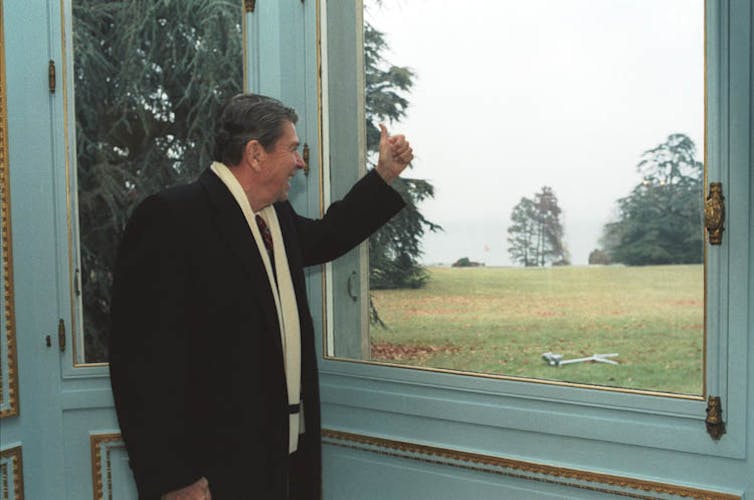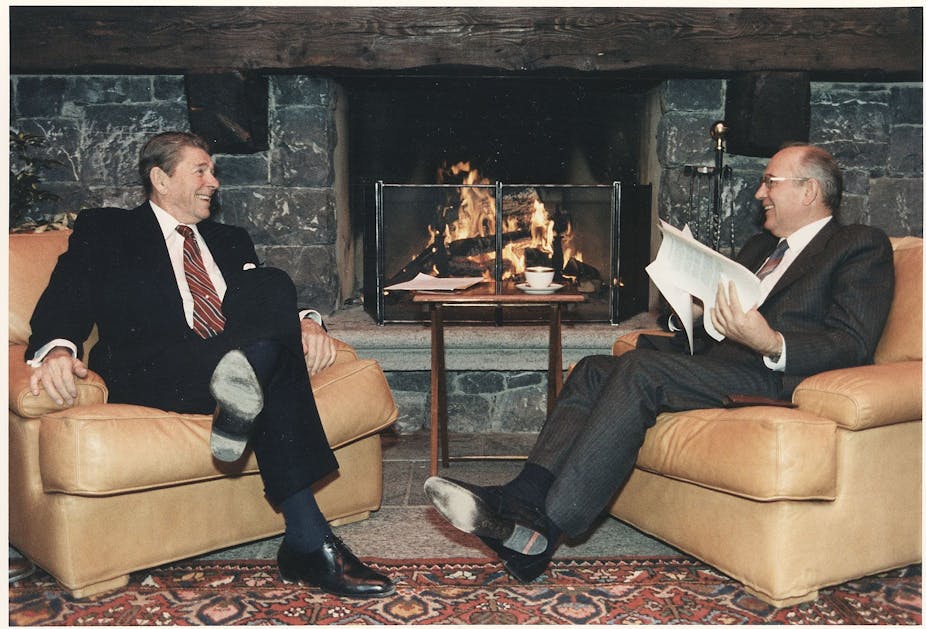Thirty years ago, US president Reagan and Soviet leader Mikhail Gorbachev met in Geneva for their first summit. And in retrospect, the historic handshake between the leaders of the two nuclear superpowers was the first step towards ending the Cold War.
Reagan had come into office with a mandate to rearm the United States and negotiate from a position of military might. His ideological antipathy to the Soviet Union was summed up in a speech he made in March 1983 when he called the Soviet Union an “evil empire”.
Yet, two years later, the president who had been seen as a nuclear war-fighter was becoming increasingly sensitive to the risks of nuclear war. Reagan found in Gorbachev a willing interlocutor who brought a generational shift in Soviet thinking, a deep-seated fear of nuclear war, and a determination to end the Cold War nuclear arms race. Three decades on, the cooperation that followed the Geneva summit has all but disappeared. The question for modern policymakers is how might that lost spirit be rekindled.
The summit barometer
During the Cold War, summitry became a barometer of the competitive pressure in superpower relations. The first US-Soviet summit in 1955, also held in Geneva, led the then president Dwight D. Eisenhower to refer to the “spirit of Geneva” to symbolise a relationship based on mutuality and dialogue.
Regular summits followed, which institutionalised a détente process of great power management manifested in the form of strategic arms-limitation talks (SALT) and other confidence-building measures, such as the 1972 Basic Principles Agreement. The collapse of détente in the late 1970s and the polarisation of superpower relations that followed, however, was symbolised in the absence of summits between 1979 and 1985.
By 1985, the urgency for re-establishing communication had never been more pressing. The 1983 NATO nuclear exercise “Able Archer” demonstrated to both sides the danger of inadvertent nuclear escalation and brought home to Reagan the realisation that Moscow might genuinely fear US nuclear intentions.
He became convinced of the need to reassure Soviet leaders that the US government had peaceful intentions and that escaping the nuclear predicament could only be achieved through dialogue and cooperation with his Soviet counterpart. Reagan later reflected that “if we were ever going to break down the barriers of mistrust that divided our countries, we had to begin establishing a personal relationship between the leaders of the two most powerful nations on earth”.
Geopolitical empathy

For his part, Gorbachev, recognising the structural failings of the communist system and embracing the need for new thinking, rejected the previous Soviet ideological creed which depicted the United States and its allies as inherently aggressive by virtue of their capitalist values and interests. As a result, both leaders approached the summit with an empathetic disposition that was open to trust in order to achieve a breakthrough.
While not insignificant, the key substantive achievement of the summit – the agreement that a nuclear war could not be won and should never be fought – was less important than the commitment to build a personal relationship as a foundation of future superpower dialogue and cooperation. Interpersonal trust-building was deliberately facilitated by private dinners with their wives after each day’s negotiations.
According to Reagan’s special advisor, Ambassador Jack Matlock, who attended the summit in Geneva, the rationale for the dinners “was built on the idea that these two leaders must not only respect each other but also like each other”, so that problems could be resolved by face-to-face meetings, rather than disagreeing publicly. The value of building trust in this way was manifested in the subsequent arms control agreements and the peaceful ending of the Cold War.
A legacy betrayed
Thirty years later, much has changed in the relationship between these two states. Fundamental to this is the perception on both sides that the other has betrayed the legacy of Geneva.
From the Russian perspective, Washington from the 1990s has sought to institutionalise Russian weakness through NATO expansion and Western interventionism that has circumvented Russian objections. Meanwhile, the shift to authoritarianism in the Russian state during Vladimir Putin’s tenure as president personifies the rejection of Gorbachev’s new thinking. Putin has abrogated the 1987 INF Treaty (negotiated on Reagan and Gorbachev’s watch), emphasised nuclear capability as the bedrock of Russian security – giving rise to fears of nuclear coercion – and forcibly violated the frontiers of the new Europe by intervening in the Ukraine.
Ironically, one of the biggest impulses to the building of trust in the second half of the 1980s was the urgency to reduce what was perceived to be the growing danger of nuclear war. In contrast, while the crises of the present period represent some opportunity for US-Russia cooperation – the Iran nuclear deal, for example – what overshadows these is the competitive approach that both sides bring to most contemporary conflicts.
While nuclear weapons still pose dangers on a more local level, there is no equivalent today of the existential nuclear threat of mutual annihilation that generated a bond of cooperation between the two leaders in the 1980s. Further, the predisposition to trust as a mechanism to break the superpower stalemate of the 1980s has been replaced with a combative personal diplomacy where the interpersonal dynamics are fuelling distrust and doing nothing to ameliorate the growing US-Russian discord. The interaction between these personal and structural obstacles to trust and cooperation between the United States and Russia make it hard to see how the spirit of Geneva can be rekindled any time soon.
On the 30th anniversary of the Geneva summit, the University of Birmingham has assembled some of the key participants from the period to reflect on whether and how trust can be rebuilt in the US-Russian relationship. Click here for information about The Geneva Summit 30th Anniversary Conference.

